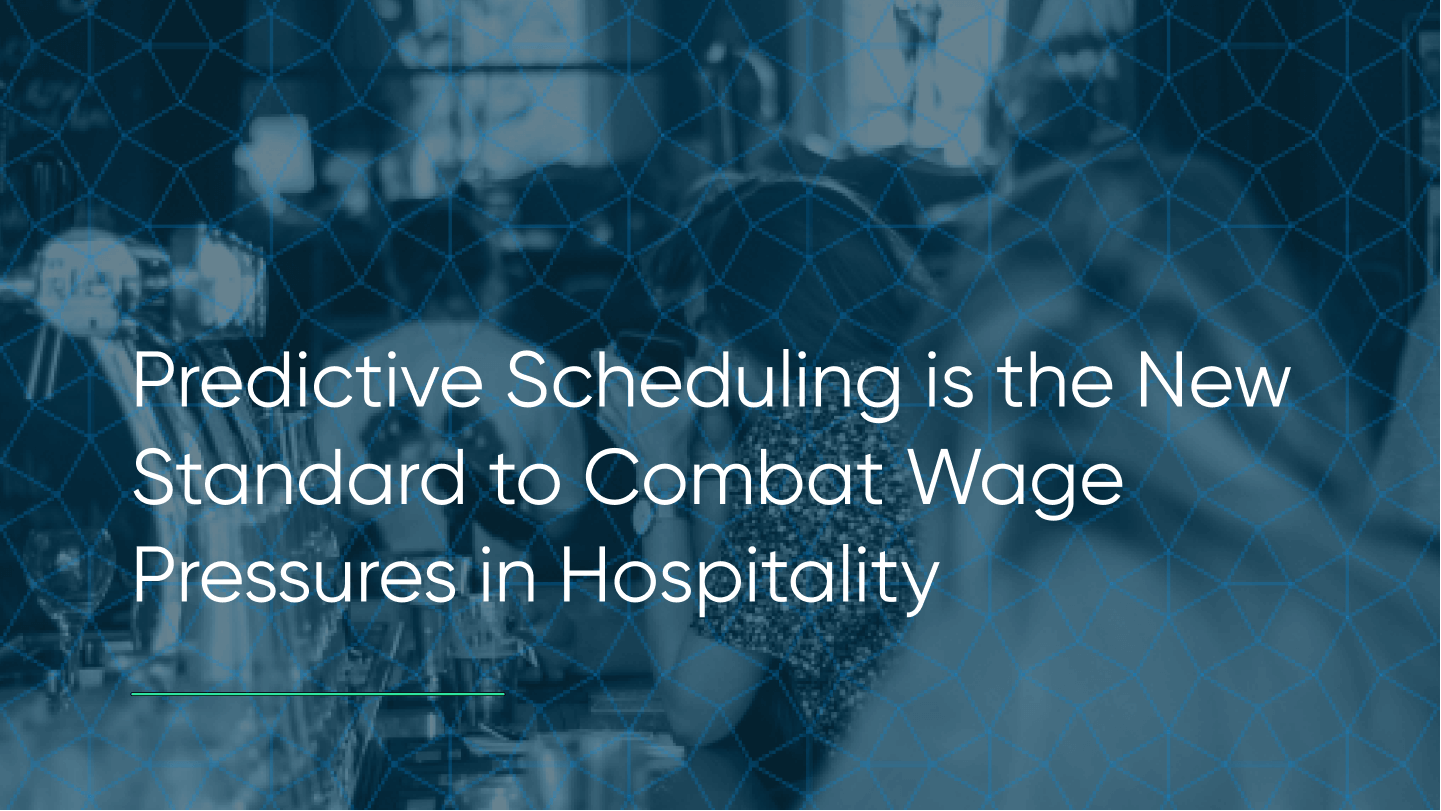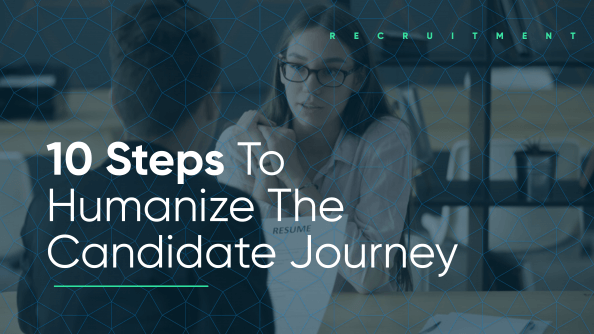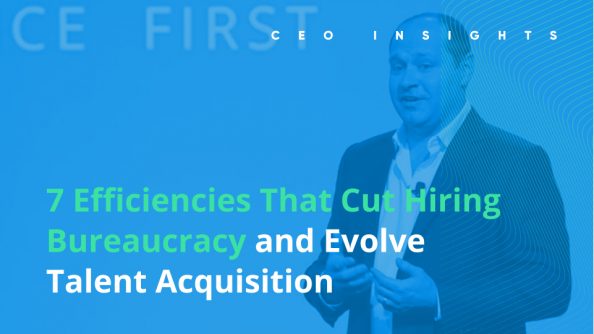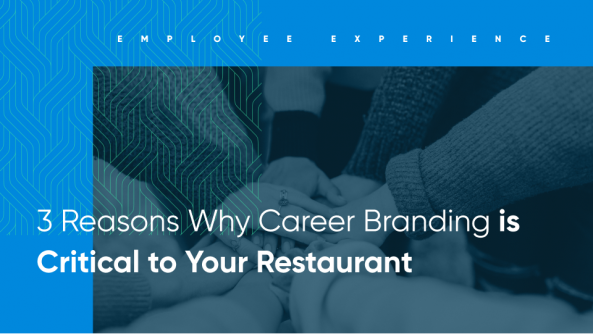Predictive Scheduling is the New Standard to Combat Wage Pressures in Hospitality

- By Harri Insider Team | March 19, 2021
The federal minimum wage has long been a topic of debate in the United States. While state-level minimum wages have seen little to no increases over the past few years, the cost of living and operating a business continue to rise.
With President Biden’s entry into office, the push for a $15/hr became a highly debated topic. Democrats will continue to push for a federal wage increase through legislative means, telling us that both restaurant operators and employees could expect serious wage changes in the future as the movement continues to gain momentum.
Rising wage pressures for hospitality operators
The debate over a $15/hr minimum wage isn’t black and white, and there are plenty of compelling arguments on how to execute a federal increase in a way that benefits both restaurants and their employees.
Supporting a $15/hr minimum wage
Those in favor of an increased minimum wage say that it could stimulate the economy by spurring job growth, reducing poverty, and curbing government welfare spending.
Specific to hospitality, higher spending power in the hands of the consumers could increase customer threshold for higher menu prices. An increase will boost employee satisfaction in their current position, resulting in higher retention rates and better guest service. This is especially true during COVID-19 where employee turnover into new industries is at an all-time high.
Fighting a sudden jump to $15/hr
Those who are against an increased minimum wage say that it could increase unemployment levels, force small businesses to close, and as a result, actually contribute to higher poverty levels.
In a hospitality setting, an increased federal minimum wage impacts more than just employees making below $15/hr. If all employees are bumped up to $15/hr, senior-level employees will also require a wage increase to accommodate skill-based compensation differences.
Failure to do so will certainly result in turnover of those senior employees, significantly increasing the scale of labor cost increase.
Many operators under this camp also argue that an increase of this magnitude came at the wrong time. Even businesses that have been financially preparing for wage increases couldn’t have predicted the economic disaster that would hit hospitality following COVID-19.
The growing popularity of predictive scheduling to offset wage pressures
No matter what side of the fence you stand on, it’s clear that a $15/hr minimum wage will bring big changes to hospitality. Business owners will need to adapt operational, and scheduling processes to remain profitable while staying in compliance with wage and labor laws.
The fight for $15/hr is far from over, and as minimum wage increases threaten to hurt hospitality’s bottom line, tech-enabled labor efficiency will be a vital tool to prepare for the inevitable.
According to our 2021 Hospitality Wage Inflation and Disruption report, 61% of hospitality operators say they do in fact plan to deploy new technologies to counteract wage pressure, with 52% planning to adopt a predictive scheduling platform.
And it’s no surprise why. With complex labor laws like Fair Workweek quickly gaining traction across the US, pen-and-paper tracking has become an obsolete way of managing and reporting on labor and wage costs.
In an industry as unpredictable as hospitality, predictive scheduling built into an all-in-one HCM platform has become the new standard for labor efficiency. An intelligent scheduling platform ensures you have the right team members in the right place at the right time — all while remaining compliant with federal and local workplace laws.
Benefits of predictive scheduling in hospitality
Rising labor costs associated with an increasing minimum wage underscores the need for labor efficiency, and it all begins with the employee schedule.
Efficient labor scheduling in hospitality is practically a full-time job within itself. Building a schedule that meets service demand, falls in line with employee availability, and doesn’t exceed labor percent spend is no easy feat. And that’s assuming there’s no last-minute changes or call-outs.
Operators that strike the balance between labor distribution and service needs will see positive outputs.
The best –and only– option is an all-in-one HCM scheduling platform like Harri that connects the dots between employee skills availability, payroll, time and attendance, and compliance.
Granular scheduling capabilities to maximize labor productivity
Intelligent scheduling software ensures there’s never a shortage of any particular position (i.e. dishwashers or servers) while maintaining an overage of any particular position. This is especially critical during a period of rising labor costs where overstaffing can result in seriously unnecessary spend.
What does your scheduling process look like? Do you start from a scheduling template, utilize position-based and skill-based scheduling, or work solely off predicted demand? Chances are you incorporate all of the above and then some.
There are seemingly endless conditions to consider when creating a schedule, some of which don’t even relate to your employees. What is your expected sales demand the day before August 11th at 6:30 pm when it’s sunny? What about when it’s raining? What about when it’s raining and it’s a Saturday?
All-in-one scheduling platforms like Harri combine all of the above to enable smarter, faster, data-driven scheduling no matter what scheduling scenario faces your team. Combine historical sales data, labor demands, weather conditions, and more to forecast labor spend, then drill down by skill set to ensure that you have the right employees on the job to efficiently meet service demand.
Pinpoint scheduling accuracy is so much more than an HCM add-on, it’s rapidly becoming a necessary tool to combat wage pressures associated with a $15/hr minimum wage. Operators that get ahead of the game will face significantly lower disruption when wage hikes hit.
Complaint scheduling to manage complex labor laws
A growing area of concern regarding wage pressures is premium payments associated with wage and labor laws. As predictive scheduling laws like Fair Workweek and Predictability Pay continue to spread across hospitality, an increasing number of hospitality businesses find themselves facing compliance-related fines to affected employees.
Most of these wage and labor laws are tied back to the employee schedule, which means operators not utilizing compliant scheduling tools are fighting an uphill battle. And if you’re not compliant from the beginning, chances are your team will face serious operational disruption while reorganizing labor distribution and spend.
Scheduling compliance violations can include many scenarios:
- Failure to published employee schedules with advanced notice
- Schedule changes after a schedule is published
- Violating an employee’s Right to Rest
- Failure to give employees paid or unpaid breaks after working a certain number of hours
- Overtime ranging from 1.5x to 2x hourly payment
- Failure to provide (and update) employe hour good faith estimates
- Asking employees to stay late or sending them home early
Paying these fines isn’t cheap with premium payments running from $20 to $100 per violation. So when your restaurant gets an unexpected rush of customers and managers need extra hands on deck, labor costs to manage those shifts will skyrocket.
But a predictive scheduling tool built for hospitality labor compliance like Harri can mitigate non-compliance wage pressure to create efficient, effective schedules.
Non-compliance alerts to actions like schedule changes or back-to-back shifts prevent operators from mistakenly making non-compliance scheduling decisions, which are easy to overlook when managing dozens of employees. Proactive warnings ensure carefree compliance from the get-go such as when advanced-notice schedules are due or when it’s time to update an employee’s good faith hour estimate based on recent shift activity.
Because all schedules are published digitally, employees and managers have access to schedules at all times. This is key for businesses undergoing a compliance investigation, where detailed information related to employee schedules is required to prove compliance with the law. In many cases, these records need to be stored for three years or longer, which is why a compliant scheduling solution ensures organization and accessibility of all key documents.
Employee-focused scheduling to boost retention
When considering employee retention, the schedule typically isn’t the first agenda item that comes to mind. But schedules dictate the way hourly employees run their lives, which means operators need to reframe the way they consider schedules.
When predictive scheduling is utilized to create labor-efficient schedules while also factoring in employee location and hour preferences, you’ll find yourself with an extremely powerful tool in your operational arsenal. This is critical when battling wage pressure to mitigate turnover and ensure top talent stays with your business.
Retention also applies to your management team. The more time managers spend on administrative and HR tasks, the less they can spend on their (extremely hectic) day-to-day. Increasing wage costs means you want to maximize time spent on operational success.
A truly people-centric scheduling platform enables employees to swap shifts with one another without consulting upper management. This saves time and effort on both ends and ensures labor gaps are filled in a fully compliant manner.
Predictive scheduling is the future of hospitality
While the jump to $15/hr will impact every business differently, there’s no doubt that hospitality will face increasing wage pressures in the very near future. And while a federal minimum wage increase comes with very good intentions, operators that aren’t prepared will need to steel themselves for adverse operational side effects.
Utilizing an intelligent, predictive scheduling platform is the only way to keep labor costs down while ensuring service quality is at its peak — especially when operating during rapidly changing, uncertain times. See how Harri keeps hospitality businesses ahead of the curve with smarter, compliance-driven scheduling.





















